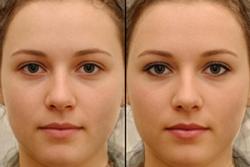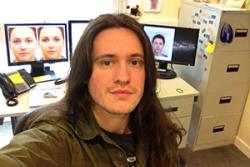The #nomakeupselfie phenomenon
A psychologist at Bangor University has been fascinated by the the #nomakeupselfie social media phenomenon seen on social media this week.
 An image with and without make-up used in the research.A research project of his, carried out at Bangor University, which will shortly be published in the Quarterly Journal of Experimental Psychology, examined the misattributions people make when considering what the opposite sex find attractive. His research project specifically examined makeup use and found some surprising results.
An image with and without make-up used in the research.A research project of his, carried out at Bangor University, which will shortly be published in the Quarterly Journal of Experimental Psychology, examined the misattributions people make when considering what the opposite sex find attractive. His research project specifically examined makeup use and found some surprising results.
Individuals believed other people find greater amounts of makeup attractive, and this is especially true for people’s ideas about male preferences. Both sexes thought that other men would find greater amounts of makeup more attractive.
This couldn't be further from the truth - when reporting their own preferences for makeup, men found faces more attractive when they were wearing less makeup, up to 40% less than the actual amount worn. Additionally, women in the study shared very similar ideas, indicating that other women look more attractive with less makeup.
 A 'selfie' of Dr Alex Jones.Dr Alex Jones of the School of Psychology said: “The take home message from this study is that our ideas about what the opposite sex find attractive are often inaccurate, whether it relates to body size, weight, or even something like makeup use. The misconceptions play a role in body image and self esteem issues and are sadly based on simple misunderstandings. I hope everyone takes the positive response to their no makeup selfies on board, and well done for raising awareness and money for a good cause!”
A 'selfie' of Dr Alex Jones.Dr Alex Jones of the School of Psychology said: “The take home message from this study is that our ideas about what the opposite sex find attractive are often inaccurate, whether it relates to body size, weight, or even something like makeup use. The misconceptions play a role in body image and self esteem issues and are sadly based on simple misunderstandings. I hope everyone takes the positive response to their no makeup selfies on board, and well done for raising awareness and money for a good cause!”
The PhD was funded through the Knowledge Economy Skills Scholarships (KESS) Programme. KESS is a major European Social Funds (ESF), European Convergence programme led by Bangor University on behalf of the HE sector in Wales.
Jones, A. L., Kramer, R. S. S., & Ward., R. (in press). Misattributions in judgements of attractiveness with cosmetics. Quarterly Journal of Experimental Psychology
Update: Since the publication of the research Dr Jones has been amazed at the interest it has received from around the world (hear him here on America in the Morning). Dr Jones has found himself in demand for Radio & TV interviews and his research has appeared in publications as diverse as Cosmopolitan, The Sydney Morning Herald and Time Magazine
Publication date: 21 March 2014
